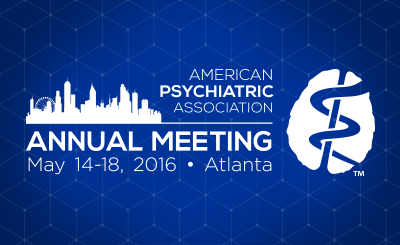Annual Meeting Session Will Offer Strategies for Managing Side Effects of Psychotropics
Abstract
Experts will present evidence-based strategies for managing some of the most common adverse effects of psychotropic medications, including weight gain, cardiovascular issues, and sexual dysfunction.
While adverse effects attributed to psychotropic medications are responsible for approximately 90,000 emergency department visits each year, the literature on the efficacy of psychotropics outweighs that of the safety of the medications.

On Monday, May 16, from 9:00 a.m. to 12 p.m., psychiatrists attending APA’s 2016 Annual Meeting will have an opportunity to increase their knowledge of common side effects of psychotropic medications; learn evidence-based strategies for managing some of the most common adverse effects of these medications, such as weight gain, cardiovascular concerns, and sexual dysfunction; and develop risk-benefit strategies for their patients taking these drugs during the “Managing the Side Effects of Psychotropic Medications” symposium. The event, which is part of the “Advances In” series, will be chaired by Joseph Goldberg, M.D., and Carrie Ernst, M.D., authors of the book Managing the Side Effects of Psychotropic Medications.
Goldberg, an associate clinical professor of psychiatry at Mount Sinai School of Medicine, will begin the symposium by reviewing key issues in assessing and recognizing potential side effects of psychotropic medications, including pharmacodynamic and pharmacokinetic considerations and pharmacogenetic predictors of adverse effects, among other topics.
He will be followed by Roger McIntyre, M.D., a professor of psychiatry and pharmacology at the University of Toronto, who will go into depth about the prevalence and scope of metabolic dysregulation associated with atypical antipsychotics and other psychotropic agents and review the benefits and risks of behavioral and pharmacologic strategies to manage iatrogenic weight gain and metabolic dysregulation.
Ernst, a consultation-liaison psychiatrist and assistant professor of psychiatry at Mount Sinai School of Medicine, will present an update on the cardiovascular and arrthythmogenic risks that can result from use of psychotropic medication. She will provide guidance in evaluating and optimizing cardiac safety when prescribing psychoactive drugs.
In the final presentation, Anita Clayton, M.D., chair of psychiatry and neurobehavioral sciences at the University of Virginia Health, will discuss another of the troubling adverse effects of these medications, namely sexual dysfunction. She will describe their differentiation from primary illness symptoms, review rates of sexual dysfunction among antidepressants in randomized trials, review outcomes after medication changes in response to sexual dysfunction, and describe strengths and weaknesses of pharmacotherapies used to counteract drug-induced sexual dysfunction.
Symposium Introduces New Nomenclature for Psychiatric Medications
Prescribers attending APA’s Annual Meeting wanting to learn about a newly proposed system for naming psychotropic medications will not want to miss the presidential symposium, “New Nomenclature for Medicines.”
A 10-member task force of international clinicians has proposed a —the Neuroscience-based Nomenclature (NbN)—reflecting a drug’s pharmacology and mode of neurobiological action. The NbN has completed its first phase based on 108 compounds delineated in a booklet and a freely available app.
The presidential symposium will include an introduction of the overall plan by David Kupfer, M.D, a member of the NbN Task Force, and APA President-elect Maria Oquendo, M.D., who is a member of a North American working group of the NbN. Joseph Zohar, M.D., will introduce a mobile phone application for the NbN plan and Pierre Blier, M.D., will illustrate its use for selection of drugs for the treatment of depression; Steven Stahl, M.D., will describe the application of the NbN for the treatment of psychotic conditions.
The symposium will take place in Room B213/214 in the Georgia World Congress Center, Level 2 on Tuesday, May 17, 2016, from 9:00 a.m. to 12:00 p.m.
Master Courses in Psychopharmacology
Several authors of APA Publishing books will also be leading master courses* on topics in psychopharmacology at APA’s 2016 Annual Meeting:
Saturday, May 14
Christopher Kratochvil, M.D.: Master Update on Pediatric Psychopharmacology - Course M6211 (9 a.m.-4 p.m. - Imperial Ballroom B, Atlanta Marriott Marquis)
Sunday, May 15
B. Timothy Walsh, M.D.: Assessment and Treatment of Eating Disorders - Course M6213 (9 a.m.-4 p.m. - Imperial Ballroom B, Atlanta Marriott Marquis)
Terrence Ketter, M.D.: Advances in Treatment of Bipolar Disorder - Course M6209 (9 a.m.-4 p.m. - Imperial Ballroom C, Atlanta Marriott Marquis)
Tuesday, May 17
Alan F. Schatzberg, M.D.: Master Course M6212: Essential Psychopharmacology (9 a.m.-4 p.m. - Imperial Ballroom B, Atlanta Marriott Marquis) ■
*Separate fee required; participants receive free book.
More information about other psychopharmacology sessions at the APA Annual Meeting can be accessed here. Use the APA Meetings App to register for the meeting, plan your itinerary, and more.



